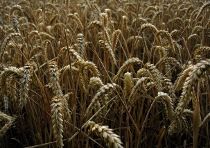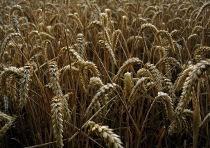Climate change spoils crops
A new study recently published in the 'Science' journal has provided evidence that rising carbon dioxide levels are having a negative effect on the nutrition gained from crops.

 A new study recently published in the 'Science' journal has provided evidence that rising carbon dioxide levels are having a negative effect on the nutrition gained from crops. Crops' ability to convert nitrate into protein has diminished as levels of carbon dioxide rise in the surrounding atmosphere. Scientists have been researching the findings at the University of California, Davis.
A new study recently published in the 'Science' journal has provided evidence that rising carbon dioxide levels are having a negative effect on the nutrition gained from crops. Crops' ability to convert nitrate into protein has diminished as levels of carbon dioxide rise in the surrounding atmosphere. Scientists have been researching the findings at the University of California, Davis.
It has been discovered that carbon dioxide is interfering with the way plants produce proteins, which leads to less protein-rich food. This carbon dioxide increase could mean that the protein content of crops falls by up to 20 per cent in the next couple of decades. New fertilizers may be required to work against the changing conditions. As climate change intensifies, this problem will only be exaggerated so it is vital that work towards the prevention of degradation in crop quality is undertaken.
Marta Lopes, a wheat physiologist at the International Maize and Wheat Improvement Center, Mexico, asserts that, "this study is alerting us about the need to develop new fertilisation techniques and to improve crops' nitrogen use efficiencies". Bloom tested the two main soil nitrogen's, nitrate and ammonium, to see how they affect crops when in a high carbon dioxide environment. The results showed that plants exposed to nitrate found it harder to produce proteins than those exposed to ammonium. Lopes has suggested that, therefore ammonium fertilizers could be an alternative but that the effects this could have on the environment must be assessed.
Scientists are aware that initially, an increase in carbon dioxide leads to an acceleration in plant growth but that as plants acclimatise to this increase their growth slows and deteriorates. Bloom has asserted that it is impossible to purely measure the response of crops to climate change purely from carbon dioxide levels. In order to develop a solution further research is needed on how plants absorb nitrate and ammonium.
In order to survive and grow plants need nitrogen, much of which is absorbed from the soil. Research has shown that the nitrogen status of plants declines significantly when carbon dioxide in the environment increases above 50 per cent, as nitrogen absorption is restricted. Bloom claims that "as atmospheric carbon dioxide concentrations rise and nitrate assimilation in plant tissues diminishes, crops will become depleted in organic nitrogen compounds, including protein, and food quality will suffer".
Over the next 20-50 years Bloom has estimated that the amount of protein in crops could decrease by up to a fifth because of increases in carbon dioxide. It has been recorded that since 1800 the concentration of carbon dioxide has increased by 39 per cent and is predicted to rise another 40 per cent by the end of this century if nothing changes.
Current information on this subject clearly demonstrates that changes need to be made. There are already measures being taking to reduce greenhouse emissions across the globe but as Bloom indicates, more research into plants assimilation of nitrates needs to be done. If no progress is made then the food market could be at risk as protein levels diminish.
Author: Rachael Bristow | Climate Action
Image: James Wheare | Flickr






